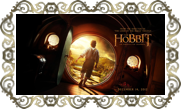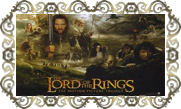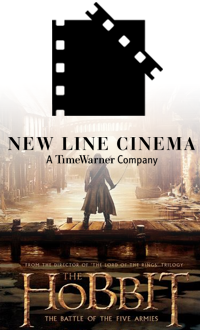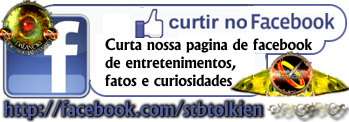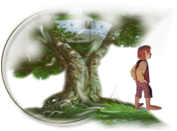

| One day, what now seems too long ago, I was lucky enough to meet and talk with Dimitra Fimi somewhere on the college grounds of Lady Margaret Hall in Oxford. It was a far too short meeting but a very pleasant one. Dimitra Fimi is one of the persons I admire a lot and also the author of a book I have truly enjoyed. Dr. Dimitra Fimi is a Lecturer in English at the Cardiff Metropolitan University and teaches and researches on many fantasy authors. In the Tolkien world she is best known for her fantastic book Tolkien, Race and Cultural History: From Fairies to Hobbits, and many contributions to higher quality Tolkien bulletins, like Tolkien Studies and of course here online Tolkien courses! So far I have not enrolled in any of the online courses she gives, but more about that in the interview below (still I should probably just make time for it ;) ). Here is an interview, that was planned a long time ago, and I was lucky to do this week. Many thanks to Dimitra Fimi for the fine answers and good luck! (you know why!) |
TL: Can you tell us a little about yourself?
DF: I am Dr Dimitra Fimi and I am a Lecturer in English at Cardiff Metropolitan University. I teach Fantasy, Science Fiction, Children’s Literature, Myth and Folklore in Literature and other related subjects at undergraduate and postgraduate level. My specialism is the work of J.R.R. Tolkien and the evolution of modern Fantasy. I gained my MA (in Early Celtic Studies) in 2002 and my PhD (on Tolkien) in 2005, both from Cardiff University.
TL: When did you fall in love with Tolkien and what prompted you to start studying his works?
DF: I was an English Lit undergraduate at the University of Athens (in Greece) when, on a trip to Britain for summer courses, I picked up the first volume of The Lord of the Rings. The experience was very similar to Tolkien’s first encounter with Finnish:
‘It was like discovering a complete wine-cellar filled with bottles of an amazing wine of a kind and flavour never tasted before. It quite intoxicated me’ (Letters, p. 214).
I just couldn’t get over how one man had managed to create a body of myths and legends comparable in scope and complexity to many real mythologies, constructed by entire cultures over many years! I just wanted to know how he did it – and that’s where the first research questions for my PhD sprang from.
| TL: Your book Tolkien, Race and Cultural History: From Fairies to Hobbits, is not only one of the most interesting and original analyses of Tolkien’s subcreation, it also won the Mythopoeic Scholarship Award for Inklings Studies for 2010, can you tell us some more about this book? DF: Thanks for your kind words! My book came out of my PhD thesis and the long hours I spent researching Tolkien’s Elves (and their earliest manifestations as fairy-like creatures); Tolkien’s invented languages (in the context of his life and times), and his switch from a mythological mode of writing to a more novelistic mode, from the ever-evolving ‘Silmarillion’ to The Lord of the Rings. A PhD thesis is a PhD thesis, though, not a book, so I took well over a year to re-write all my material, add new findings and make sure the entire thing worked well together. There are some large sections of my PhD that never made it into the book – at some point, I will need to dig out the research data from these parts and do something with it! The Mythopoeic Scholarship Award for Inklings Studies was a truly lovely surprise! I was so very proud to have been shortlisted, but to win it was overwhelming indeed! I am very grateful to the Mythopoeic Society members who read and nominated my book. |
TL: Wouldn’t you agree that the study of the 12-volume History of Middle-earth is one of the key elements to bring out new ideas and wouldn’t many authors succeed in writing far better books on Tolkien if they also studied these amazing books?
DF:The History of Middle-earth series is a brilliant resource for any serious students of Tolkien’s work. Yes, it’s not the easiest read; yes, it has all the hallmarks of a serious scholarly edition (with complicated notes and asides, rather than just Tolkien’s prose or poetry); but it is simply indispensable for understanding Tolkien’s creative process and the evolution of his ideas. There was a time – until fairly recently – when many Tolkien scholars were content with writing academic essays and books on The Hobbit, The Lord of the Rings and the published Silmarillion only, but this time is now gone and any serious Tolkien scholar is expected to have at least read and taken into consideration The History of Middle-earth.
TL: Can we expect any new books from you in the future?
DF: Yes, that’s the plan! As always, I am working on several different things, all at the same time (!) but I will hopefully decide on which project to concentrate on for the next book very soon.
TL: Can you tell us a little bit about the course you give at Cardiff Metropolitan University called “J.R.R. Tolkien: Myth and Middle-earth in Context”?
DF: This is probably one of the best things I’ve ever done, even if I do say so myself! This is a course delivered and taught entirely online via my University (Cardiff Met), and open to students and adult learners alike, wherever in the world they might be! The course is asynchronous (there are no demands to be online at a certain time – all students can complete each week’s Unit at their own pace) which allows people from all different time zones to join. I have had students from Europe, New Zealand, the US and Japan all in the same class!
The course is accredited at MA Level (it carries 20 credits at Masters level) and approaches Tolkien via a dual lens: Tolkien as a writer responding to and (re)writing the Middle Ages, and Tolkien as a 20th-century author, very much influenced by his own times and intellectual history. This approach allows me to cover Tolkien’s mythological sources (Old Norse, Finnish, Anglo-Saxon, Celtic, etc) but also his work within the context of 20th-century concerns and anxieties (the two World Wars, ideas of race and gender, etc). We also devote an entire Unit to Tolkien’s invented languages, which, to my mind at least, are not just a fanciful ‘accessory’ to Tolkien’s legendarium, but an integral part of his subcreation that deserves close attention.
The course runs for 12 consecutive weeks (10 weekly Units plus a Reading Week in the middle and an Essay-Writing week at the end) and it includes written lectures, as well as material in audio and video format. My students also have access to two guest lectures: one by Tom Shippey on The Legend of Sigurd and Gudrun, and one by John Garth on Tolkien and the Great War.
All students also get access to Cardiff Met’s Electronic Library which includes a series of e-books (such as the J.R.R. Tolkien Encyclopedia) and e-journals (e.g. Tolkien Studies and Mythlore) as well as databases and other electronic resources.
| For a course overview see here: J.R.R. Tolkien: Myth and Middle-earth in Context And for a Unit-by-Unit outline of the course see the video presentation to the right. Apart from the Tolkien course, I also run a Year 3 undergraduate-level online course on Fantasy Literature and its evolution from Victorian fairy tales to modern imaginary worlds (from MacDonald and Morris to Philip Pullman and J.K. Rowling). See here for more information on that course: Fantasy Literature: Tales Before and After Tolkien |
TL: How often do these online courses run? When is the next Tolkien online course due to run again and how can people enrol?
DF: I usually run these courses twice a year: the Fantasy course every summer term (usually starting in May and ending in July) and the Tolkien course every autumn term (usually starting in September/October and ending in December). The Tolkien online course will run again very shortly – starting on 19th September 2012, and enrolment is already open! (and places filling up quickly I hear!)
I might as well let everyone know via this forum that I am intending to take a break from teaching online for approximately a year so this is the last opportunity for potential students to take my Tolkien online course for a little while!
TL: You were nominated for and awarded a Fellowship for Most Inspiring Lecturer this year by students at Cardiff Metropolitan University. Now that must be amazing?
DF: This was truly humbling – there are all sorts of praise that may come from colleagues or management, but to be recognised by the students was one of the best moments of my career. Cardiff Metropolitan University asked students to vote for the best lecturers in five categories, and I was voted the Most Inspiring Lecturer, and was presented my fellowship at this year’s Graduation, I was very moved indeed!
TL: It must be great to be able to teach Tolkien! There are not many who can say their job is talking about Tolkien!
DF: Best job in the world! I am one of those few lucky academics who don’t teach Tolkien on the side – as it were – of a more ‘serious’ or canonical specialism, but as one of my main areas.
TL: After so many years running these courses, there must be some success stories from former students you might wish to share with us?
DF: Oh yes, indeed! Many of my students took part in or provided papers at the recent Postgraduate Symposium organised by the Tolkien Society as part of the recent Return of the Ring, held at the University of Loughborough. I was involved in the organising of this Symposium, and was proud beyond belief to see my former students presenting original research on Tolkien!
Sandra Hall and Andrew Higgins presented two excellent papers based on essays submitted for my Fantasy and Tolkien online courses respectively. Sara Brown, Sonja Virta and Elise McKenna continue to conduct original research on Tolkien and presented brilliant papers too.
Other successes include Marie-Noelle Biemer, whose essay for my Fantasy online course (greatly expanded) was published last March in the journal Fastitocalon, while Andrew Higgins is now doing his PhD under my supervision on the early phases of Tolkien’s legendarium. Many congratulations to all of them!
TL: Can we expect any of your former students to come up with new books, studies or projects on Tolkien that might be of interest to us?
DF: Yes, I certainly hope so! As I mentioned above, one student has already published, while others are preparing work for publication as we speak!
TL: Your courses have some amazing guest lecturers like Tom Shippey and John Garth. Will these lectures ever get published? Or are they available online?
| DF: There is a taster of Tom Shippey’s lecture (two clips) on Youtube via the links below, but to get access to the entire Tom Shippey and John Garth lectures, Tolkien fans will have to enrol on the course, I’m afraid! Tom Shippey Lecture at Cardiff Met - Part 1: Tom Shippey Lecture Part 1 Tom Shippey Lecture at Cardiff Met - Part 2:Tom Shippey Lecture Part 2 |
TL: Your roots are in Greece, how do the Greeks experience Tolkien? Is there a nice fan community?
DF: To be absolutely honest, I was a student of English at the University of Athens so I never read Tolkien’s books in Greek translation! Nowadays there is a very active Tolkien Society in Greece (see http://tolkien.gr) but back in the day when I first discovered Tolkien, his work was not as well known as it is today. The Peter Jackson films played a very important role in opening up Tolkien’s work to a wider readership.
TL: You lecture in Wales. Much has been written lately about the connection of Tolkien and Wales. What are your thoughts?
DF: Some of my first published work was exactly on that topic, as I examined Tolkien’s relationship with ‘things Celtic’ including medieval Irish and Welsh literature (a 2006 article in the journal Folklore, entitled ‘“Mad” Elves and “Elusive Beauty”: Some CelticStrands of Tolkien’s Mythology’; and a 2007 one in the journal Tolkien Studies titled ‘Tolkien’s “‘Celtic’ type of legends”: Merging Traditions’). The Second Part of my book (Tolkien, Race and Cultural History) focuses on Tolkien’s languages and includes a discussion of the Welsh language and its effect on Tolkien’s linguistic theories.
| I have also given public lectures on Tolkien’s Welsh places and inspirations in Cardiff and elsewhere in Wales. The best of those events was a ‘literary walk’ organised by Literature Wales in June 2011, in which I led attendees on a walk around Buckland in the Black Mountains (mid-Wales) and talked on Tolkien’s use of the Welsh language and literature. See here some video footage from that unusual outdoors lecture. |
Further research on Tolkien’s Wales and use of Welsh has been recently published, like Carl Phelpstead’s Tolkien and Wales and Mark Hooker’s Tolkien and Welsh. Both are excellent contributions to the field.
TL: One final question… making a trilogy of The Hobbit, what is your opinion on that?
DF: I enjoyed the films of The Lord of the Rings, and I am sure I will enjoy the latest trilogy too (even if I struggle to think how Peter Jackson is going to stretch The Hobbit to three films!). I have actually contributed an essay to Janice Bogstad and Philip Kaveny’s Picturing Tolkien book on Jackson’s Lord of the Rings trilogy but my main scholarly concern remains Tolkien’s written word.
| Tolkien, Race and Cultural History: From Fairies to HobbitsHardcover: 264 pagesPublisher: Palgrave MacmillanAuthor: Dimitra Fimi Publication date: 26 Sep 2008Language: EnglishISBN-10: 0230219519ISBN-13: 978-0230219519 |
Spread the news about this J.R.R. Tolkien article:
Read more http://feedproxy.google.com/~r/TolkienLibrary/~3/04GvLY5IPj8/1057-interview-dimitra-fimi.php
